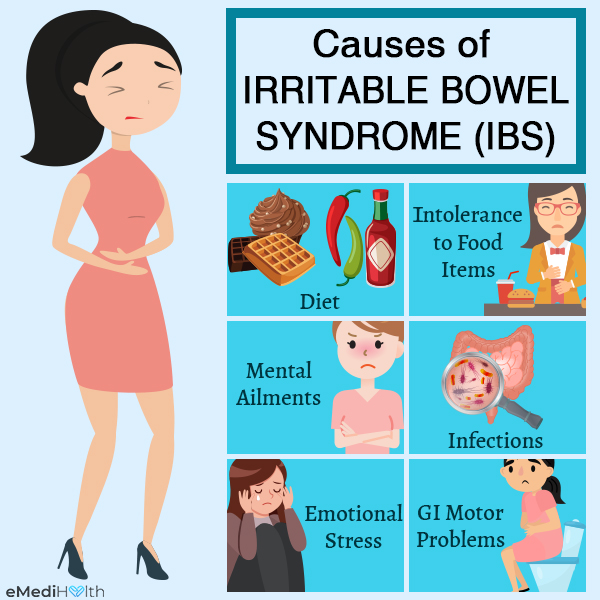In this article:
Irritable bowel syndrome (IBS) is a common digestive disorder that leads to the simultaneous onset of several distressing symptoms like recurrent abdominal pain as well as bouts of diarrhea and constipation.

The exact cause for this condition is unclear but it can be triggered by a variety of factors. Since there is no single etiology for this disease, and the symptoms vary from person to person, the treatment for IBS has to be fine-tuned according to the needs of each individual patient.
Bur bear in mind, the goal of treatment is to ease your digestive distress and reduce flare-ups rather than curing the condition itself.
Causes of Irritable Bowel Syndrome
The exact etiology of IBS is not clearly known as of yet. However, several factors may engender it. These include:

1. Diet
Diets low in fiber content or containing extremely sweet or spicy foods.
2. Intolerance to food items
Poor digestion of the sugars lactose (present in most dairy and processed items), fructose (found in syrups), and sorbitol (found in stone fruits and dried fruits).
3. Infections
Bacterial infections in the digestive tract such as gastroenteritis (even after the microorganism has been removed).
4. Excessive bacteria
Increased number of bacteria in the small intestine or a change in their type.
5. Psychosocial factors of psychosocial dysfunction
Anxiety disorder, depression, and somatic symptom disorders.
6. Early life events
Traumatic memories of the past that may have induced stress, such as physical or sexual abuse.
7. Emotional stress
Strong emotions, such as anger, anxiety, frustration, nervousness, and stress, which can affect the bowel nerves.
8. Gastrointestinal motor problems
IBS is characterized by an abnormal or irregular movement of the colon muscles. Constipation occurs when the intestinal muscles do not move as fast as they normally should, whereas loose motions are the result of unusually rapid muscle movement.
Standard Medical Treatment

Your doctor will most likely prescribe medications to soothe your symptoms. These include:
1. Anti-diarrheal drugs
Anti-diarrheal drugs such as loperamide or Vibrezi. However, individuals who consume alcohol or those who have had their gallbladder removed should avoid using Vibrezi.
2. Antibiotics
Antibiotics may be prescribed if tests show an overgrowth of intestinal bacteria.
3. Antispasmodic medications
Antispasmodic medications such as dicyclomine, hyoscine, pinaverium, and cimetropium to regulate the contractions of the colon muscles and relieve the abdominal pain.
4. Medicine for women with constipation-predominant IBS
IBS medicine for women who have constipation-predominant IBS includes lubiprostone (FDA approved), Linaclotide, and Prucalopride.
5. Laxatives and stool softeners
Laxatives and stool softeners are routinely used as the first-line treatment for IBS-C, as they help stimulate bowel movement and facilitate the easy passage of stools to relieve constipation. (1)
Laxatives, especially those that contain non-digested sugars or sugar alcohol, do not suit everyone but the ones containing polyethylene glycol are usually found to be the most effective, provided they are taken in the correct dosage.
6. Surgical options
If your IBS symptoms do not respond to any of the above-mentioned drug therapies or if your condition gives way to more serious complications, your doctor may consider surgical options.
Depending upon the severity of your IBS, your colon may have to be removed either partially or entirely. Surgery is mostly recommended for older patients who have grappled with this illness for many years.
7. Biofeedback
Biofeedback is a new-age therapy that involves recording the patient’s physiological responses to stress and relaxation. The findings are then shared with the patient. (2)
Through this feedback, the patient learns to manipulate his/her physiological activity to get better health results. The same technique may enable IBS patients to improve their digestive functioning as well.
How is IBS Diagnosed?
Diagnosing IBS is very important in order to get prompt treatment.
- The doctor first assesses your symptoms and analyzes your family and medical history.
- This is followed by a physical examination. The doctor evaluates your condition, checking for pain and bloating in your abdominal region. The doctor may also check the sounds in your stomach using a stethoscope.
- Some tests may also be prescribed by the doctor to rule out other conditions that may be causing your symptoms and to get an inside view of the digestive tract to detect any abnormalities. These include:
Final Word
The cause of IBS is multifactorial and therefore, not one strategy is likely to benefit. A combination of lifestyle, dietary, medical, and psychological interventions is likely to be needed to control IBS symptoms.
You have to work closely with your doctor to come up with a treatment plan that is customized to meet your individual needs. Continuity of care is equally important to ensure successful outcomes since this is a chronic problem that can only be managed rather than cured.

- Was this article helpful?
- YES, THANKS!NOT REALLY



